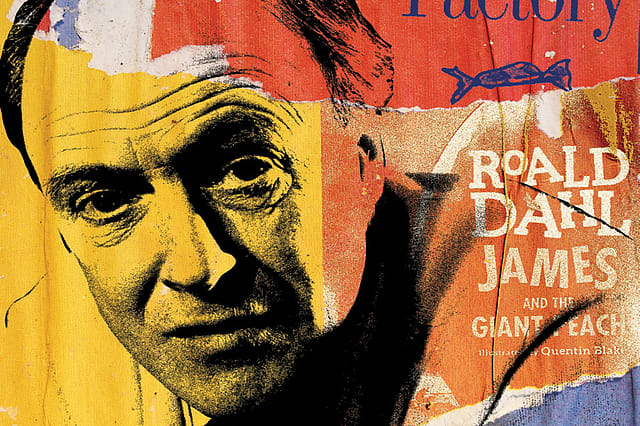Roald Dahl: Writer Redacted

IN 1961, A NEW children's book hit the shelves in the US. Titled James and the Giant Peach, the book told the story of an orphan who embarks on an adventure with some bugs inside a gigantic magical peach. But before he sets off, the giant peach rolls onto and crushes a pair of evil aunts who have been tormenting the orphan to death.
The book was among the earliest of Roald Dahl's foray into children's literature. A writer of short stories for adults whose writing career had somewhat stalled by then, Dahl had come up with James and the Giant Peach from the bedtime stories he told his daughters. The book became a bestseller, and set him on course to become one of the world's most popular children's writers.
But it also immediately raised the hackles of some parents, most notably, for the violence in the story (from the abuse the boy suffers to the way the aunts are killed) and the depiction of the aunts as "hags", "enormously fat" and "bony". It would become a window to the sort of reception Dahl's works would receive throughout his lifetime, and more so, beyond. He would churn out one book after another, bursting with colourful and irreverent stories that made children cackle with glee, but which often ran afoul of the priggish middle-class sensibilities of their parents.
Openomics 2026: Continuity and Conviction
06 Feb 2026 - Vol 04 | Issue 57
The performance state at its peak
Dahl occasionally made concessions. Like the time he turned the Oompa Loompas of Charlie and the Chocolate Factory from an African pygmy tribe in its earliest edition to people from a fictionalised Loompaland to avoid controversy. He otherwise fiercely defended any attempts to alter his works to suit adult sensibilities.
But that was the 1960s. The world of literature today is fraught over issues of representation and giving offence. More than three decades since Dahl's death, the sanitisation of Dahl is underway. Puffin, the children's literature imprint of Penguin Random House, and the estate that controls Dahl's works, have come out with new British editions of his books, where words and phrases that were deemed offensive, especially by today's standards, have been rewritten or entirely removed.
The changes appear quite wholesale. At least 10 of his 19 books have been rewritten, according to reports. Words like "fat", "crazy" and "ugly" have been entirely removed. Double chins have been excised. Boys and girls have become "children", mothers and fathers simply "parents", the Cloud- Men in James and the Giant Peach have become Cloud- People, all of this presumably in an effort to impart more gender-neutrality. In The Witches, "old hags" has been replaced with "old crows", and a reference to a witch posing as a woman "working as cashier in a supermarket or typing letters for a businessman" has been changed to a woman who "may be working as a top scientist or running a business." A mention of Rudyard Kipling, not the most popular figure in contemporary times, in Matlida has been replaced with Jane Austen. Fantastic Mr Fox now has three daughters, instead of three sons. The list goes on.
But re-edits of such a nature, where you tweak an old work when the author is not around anymore, is a new and potentially dangerous tool. It comes with no limiting principle, as Suzanne Nossel, the CEO of the non-profit PEN America, described on Twitter: "You start out wanting to replace a word here and a word there, and end up inserting entirely new ideas."
Dahl was not a pleasant person. He was quarrelsome, probably anti-Semitic, and was always getting into spats. But the self-described "geriatric child" got children in the way adults did not. Children loved his books, he would say, because he entered into a conspiracy with children against the grown-up world through them. "When I write a book which vilifies parents or teachers… children absolutely love it," Donald Sturrock quotes Dahl in his biography of him. "This is because the children shout, 'Hooray, here at last is a grown-up who understands what it is like to be one of us.'"
